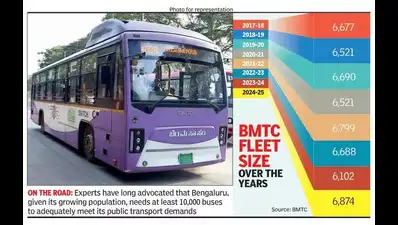PM e-Drive scheme: Electric buses to take Bengaluru fleet size to over 10,000 | Bengaluru News

Bengaluru: After stagnating at around 6,700 buses for nearly eight years despite an exponential increase in Bengaluru’s population, the city’s bus fleet is set to breach the 10,000-mark soon on the back of the addition of 4,500 electric buses, likely over the next one year.The addition under the PM e-Drive scheme will provide a significant boost to green mobility in Bengaluru. Experts have long advocated that Bengaluru — given its growth rate and attendant urban transport ills — requires no less than 10,000 buses to adequately meet its public transport demand. To make best use of the expanded fleet, they cautioned against prioritising only high-profit routes or renting buses to private companies at the expense of commuters.For the record, Bengaluru accounts for over 1.2 crore vehicles, and more than 1 crore of them are private bikes and cars. The city, which recently reaffirmed its dubious status of being among the slowest cities for traffic in the world, had failed to add a significant number of buses to its fleet since 2017-18. Currently, the fleet has just 6,800 buses, with electric vehicles accounting for 25% of them.In a major step towards addressing this, Bengaluru is set to receive 4,500 e-buses under the PM e-Drive Scheme, the largest allocation among all participating cities. The announcement came after a high-level meeting chaired by Union minister for heavy industries and steel HD Kumaraswamy, which discussed the rollout of the scheme across states.Prof Ashish Verma, convener of Sustainable Transportation Lab at Indian Institute of Science, welcomed the move but emphasised the need for a strategic approach to implementation. He stressed that simply increasing the number of buses is not enough. “BMTC must adopt a rational and scientific approach in the deployment of its fleet, including planning routes, optimising schedules, and preventing issues such as bus bunching.The focus should be on maximising public benefit rather than commercial interests.”A press release from the Union minister’s office said 2,000 buses would be allocated to Hyderabad, 2,800 to Delhi, 1,000 to Ahmedabad, and 600 to Surat under the current phase of PM e-Drive.“From Bengaluru to Delhi, cities are actively embracing e-buses to make public transport cleaner, smarter, and more efficient. We aren’t merely allocating e-buses, we’re shaping the future of India’s transport system with innovation and environmental consciousness,” the minister added. “With close coordination between the Centre and states like Telangana, Karnataka, Delhi and Gujarat, we are determined to deliver on the PM e-Drive promise.” The scheme aims to deploy 14,028 e-buses with a total outlay of Rs 10,900 crore over a two-year period — from April 2024 to March 2026.Recently, state transport minister Ramalinga Reddy met the Union minister to seek the allocation of e-buses under the central scheme. Currently, BMTC operates 1,405 e-buses through agreements with four private operators. These buses run under the gross cost contract model. Additionally, BMTC is set to induct 370 more buses under existing agreements.A majority of e-buses in the current fleet were inducted under FAME (Faster Adoption and Manufacturing of [Hybrid and] Electric Vehicles) scheme. As BMTC shifts gears for a greener Bengaluru and better commuting experience for its citizens, it should promote public transport by introducing dedicated bus lanes and other infrastructural improvements, an expert said.
















